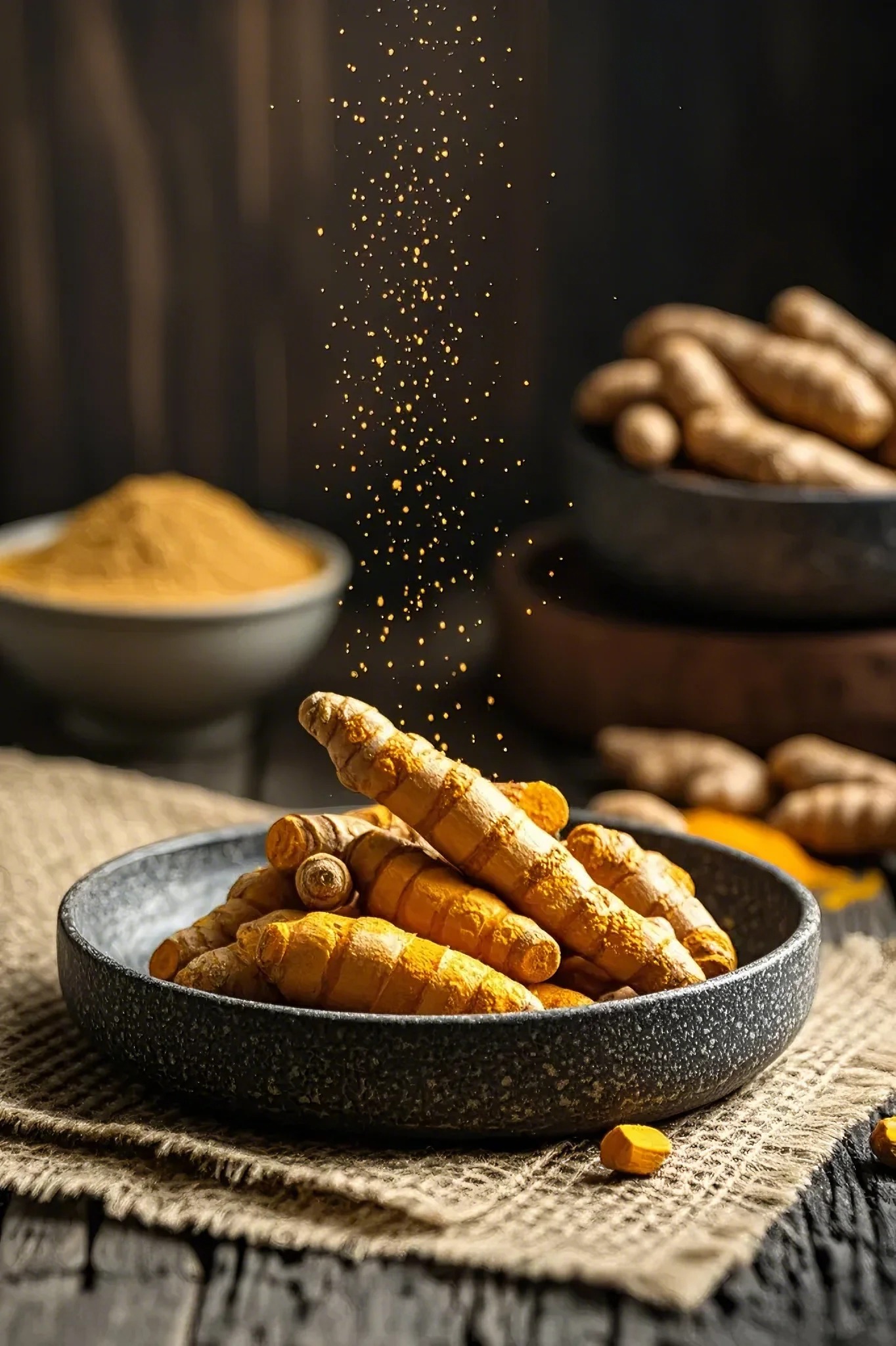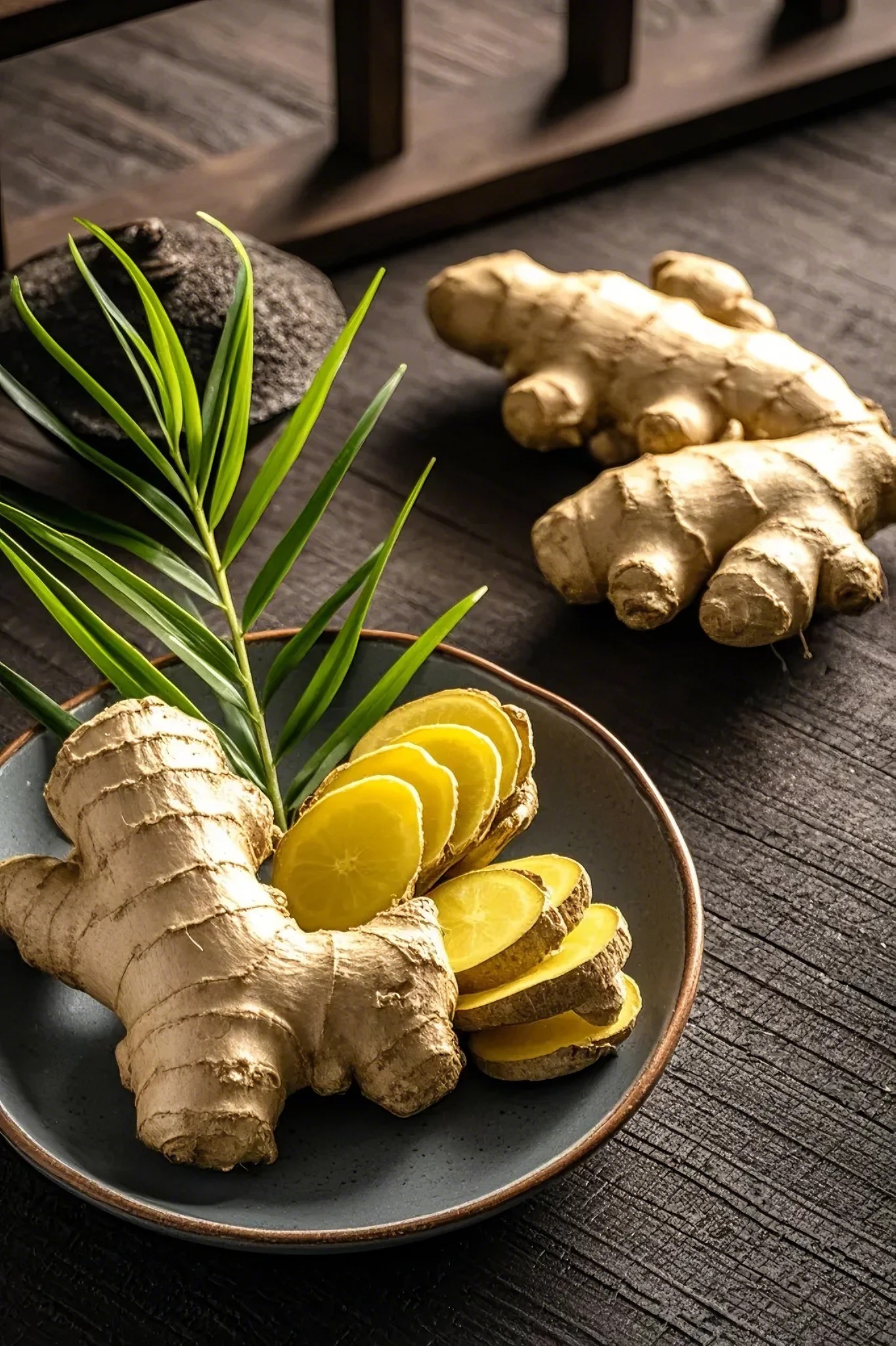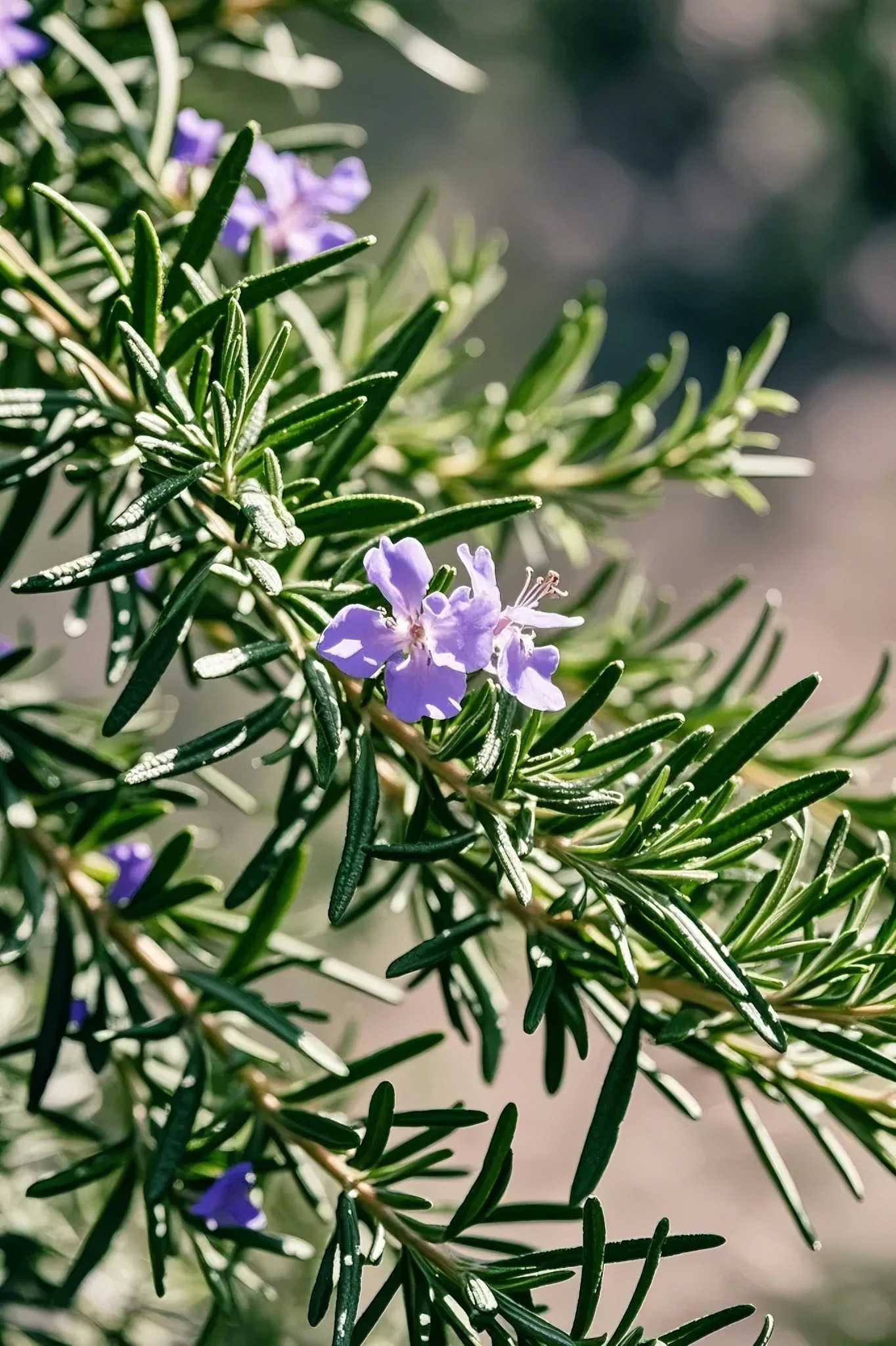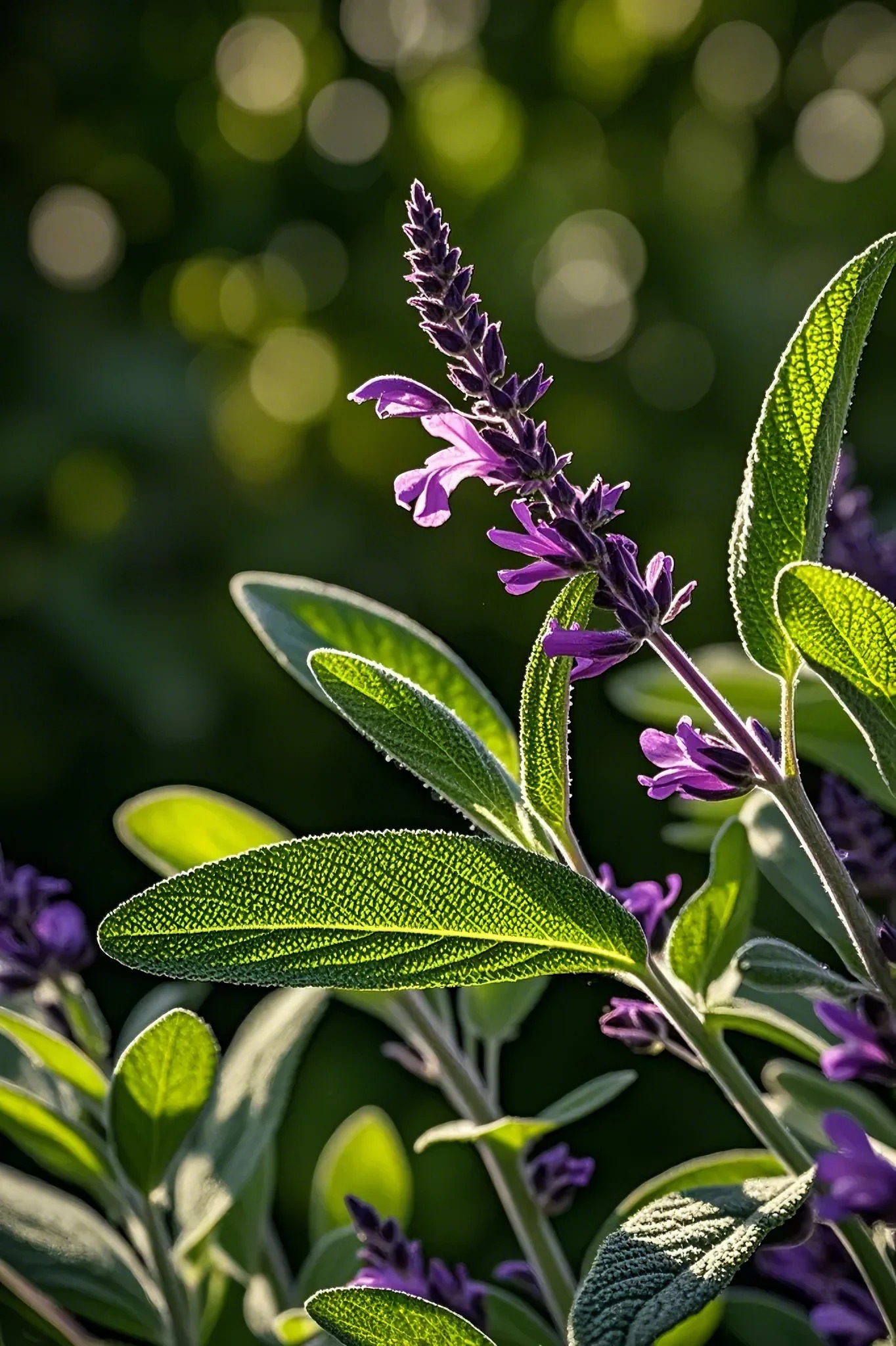The Secrets of Ancient Herbs: Health Benefits You Need to Know
What if I told you there are plants—right under our noses—that have been treating pain, easing stress, and healing ailments for thousands of years?
From a flower that fights anxiety to a root that soothes nausea, these traditional herbs could change your life, and they’re backed by science.
Today, we’re diving into the world of powerful medicinal herbs—plants that were relied upon by our ancestors and are still essential today.
With science now revealing how effective these ancient herbs truly are, it’s time to rediscover their healing power and see how these 10 incredible plants can support everything from better digestion to reduced stress, enhanced sleep, and more. Let’s get into it.
In today’s fast-paced world, many people rely on pharmaceuticals for relief from common ailments—stress, insomnia, digestive discomfort, and pain, to name a few.
But these solutions often come with side effects.
Imagine if there were natural alternatives with centuries of use, backed by both history and science.
Could these herbs be the safer, natural remedy we’ve been overlooking?

Ancient Herbs
Lavender
Lavender isn’t just a pleasant-smelling flower; it’s a powerhouse for relaxation. Used by ancient Greeks and Romans in their bath rituals, It has been prized for centuries for its soothing properties and versatile benefits. Here are some of its top advantages:
1. Promotes Relaxation and Reduces Anxiety
Lavender is well-known for its calming effects on the nervous system, making it helpful for reducing stress and anxiety. Studies suggest that inhaling lavender essential oil or using it in aromatherapy can lower cortisol levels, helping the body relax and reducing symptoms of anxiety.
2. Improves Sleep Quality
Lavender is commonly used to combat insomnia and improve overall sleep quality. Its calming aroma has been shown to enhance deep, restful sleep when used in diffusers or applied to pillowcases. Many people find lavender especially useful as part of a nighttime routine to encourage natural sleep rhythms.

3. Supports Skin Health
Lavender has anti-inflammatory, antibacterial, and antioxidant properties, making it beneficial for skin care. It can help soothe acne, reduce redness, and relieve itching from minor skin irritations. Lavender oil is often used in creams and lotions for its ability to calm the skin and promote healing, especially for conditions like eczema and psoriasis.
4. Relieves Pain and Reduces Inflammation
Lavender has mild analgesic properties, making it a natural remedy for pain relief. It’s often used to relieve headaches, muscle pain, joint pain, and menstrual cramps. Massaging lavender oil onto sore muscles or using it in a warm bath can help alleviate discomfort.
5. Supports Digestive Health
Lavender may also aid digestion by reducing symptoms like bloating, nausea, and stomach cramps. In traditional medicine, lavender has been used as a mild remedy for indigestion and upset stomach, helping to relax the digestive tract.
6. Promotes Hair Health
Lavender oil is thought to improve hair health by promoting blood circulation in the scalp, which may stimulate hair growth. It also has antifungal and antibacterial properties that help prevent dandruff and soothe an irritated scalp.
7. Boosts Mood and Cognitive Function
Lavender’s scent is often used to lift mood and improve concentration. Research shows that inhaling lavender can enhance mental clarity, reduce symptoms of depression, and improve cognitive function, helping with focus and memory retention.
8. Acts as a Natural Insect Repellent
Lavender’s scent deters pests like mosquitoes, flies, and moths. Lavender essential oil or sachets can be used as a natural alternative to chemical repellents, making it ideal for outdoor activities and around the home.
9. Helps Balance Hormones
Some research suggests that lavender oil may help balance hormones, especially in women. Lavender is thought to have mild estrogenic properties, which could benefit conditions related to hormone imbalance.
10. Supports Respiratory Health
Lavender oil’s anti-inflammatory and antimicrobial properties can benefit respiratory health. It may help ease symptoms of colds, asthma, and sinus congestion when inhaled or used in steam therapy, reducing inflammation in the respiratory tract.
Lavender’s versatility makes it a natural, gentle remedy for a range of everyday issues. However, always use essential oils with caution, especially if you have sensitive skin or allergies.
Dandelion
Once considered a pesky weed, dandelion has been valued in traditional medicine for centuries and is one of the ancient herbs. Known for its nutrient-rich leaves and roots, dandelion is packed with antioxidants that help protect against chronic diseases
Packed with a range of health benefits due to its nutrient-rich properties. Here’s why it deserves a spot in wellness routines:

1. Rich in Nutrients
Dandelion greens are highly nutritious, containing vitamins A, C, K, and B-complex, as well as minerals like iron, calcium, magnesium, and potassium. They’re also a source of antioxidants, which help fight oxidative stress and protect against cellular damage.
2. Supports Liver Health
Dandelion is commonly used in traditional medicine as a liver tonic. It helps stimulate bile production, aiding in the detoxification process. This function assists in cleansing the liver, potentially supporting liver function and protecting against liver-related issues.
3. Aids Digestion
Dandelion root acts as a mild laxative, which can help promote regular bowel movements and relieve constipation. It also stimulates appetite and can reduce symptoms of indigestion. Dandelion’s prebiotic fibre, inulin, supports gut health by feeding beneficial gut bacteria.
4. Helps Regulate Blood Sugar Levels
Early research suggests that dandelion may help regulate blood sugar by improving insulin sensitivity and reducing glucose absorption. The antioxidants in dandelion, like chicoric and chlorogenic acids, may also assist in lowering blood sugar levels, which could benefit those with insulin resistance.
5. Promotes Kidney Health and Acts as a Natural Diuretic
Dandelion is a natural diuretic, meaning it encourages the production of urine. This helps flush out excess water and waste from the kidneys, which can aid in reducing water retention and supporting kidney health.
6. Anti-Inflammatory Properties
Dandelion contains compounds that have been shown to reduce inflammation, making it potentially beneficial for conditions like arthritis. Its anti-inflammatory properties come from compounds like polyphenols, which may help reduce symptoms of chronic inflammation over time.
7. May Improve Heart Health
Dandelion’s rich potassium content can help regulate blood pressure, as potassium is essential for heart health and proper blood flow. Its antioxidant properties may also reduce the risk of plaque build-up, potentially lowering cholesterol and supporting cardiovascular health.
8. Boosts Immune Function
The antioxidants and anti-inflammatory compounds in dandelion, along with its vitamin C content, may help strengthen the immune system. These properties can help the body combat infection and inflammation, potentially speeding up recovery from minor illnesses.
9. Supports Skin Health
Dandelion can be beneficial for skin conditions like acne, eczema, and psoriasis. Its detoxifying and anti-inflammatory properties may help reduce redness and irritation, while its antioxidants can protect skin from premature aging.
10. Assists in Weight Loss
Dandelion’s diuretic effect helps flush out excess water weight, which can be beneficial for those with water retention issues. Some studies suggest it may also influence fat absorption and carbohydrate metabolism, though more research is needed in this area.
11. May Help Fight Cancer
Research on dandelion’s anticancer potential is still in early stages, but some studies indicate that dandelion root extract may induce apoptosis (cell death) in certain cancer cells. Although more research is necessary, these findings show promising avenues for its role in cancer prevention and treatment.
Dandelion is versatile: its leaves can be eaten fresh in salads, its root can be brewed as tea, and its extract is widely available in supplement form. However, if you’re on medications or have certain health conditions, consult a healthcare provider before incorporating dandelion regularly, as it may interact with some medications.
Peppermint
Peppermint is more than a breath freshener; it’s also one of the ancient herbs and is a remedy for digestive troubles and headaches. Ancient Egyptians and Romans valued peppermint’s calming effects on the stomach.
Cherished for its fresh aroma and cool taste, is also a powerhouse of health benefits. Here are some of its top uses:

1. Aids Digestion and Reduces Bloating
Peppermint is widely known for its ability to ease digestive discomfort. The menthol in peppermint relaxes the muscles in the gastrointestinal tract, helping to relieve bloating, gas, and indigestion. Peppermint tea or essential oil capsules are often used as a remedy for irritable bowel syndrome (IBS) and other digestive issues.
2. Relieves Headaches and Migraines
The menthol in peppermint oil can help reduce headache symptoms by promoting blood flow and relaxing tense muscles. Applying diluted peppermint oil to the temples or inhaling its aroma can provide relief from tension headaches and migraines, offering a natural alternative to pain relievers.
3. Reduces Nasal Congestion and Respiratory Issues
Peppermint’s cooling effect makes it a popular choice for alleviating nasal congestion, especially during colds or allergies. Inhaling peppermint steam or using peppermint oil in a diffuser can help open airways, reduce inflammation, and make breathing easier.
4. Boosts Energy and Mental Focus
Peppermint’s invigorating scent has been shown to increase alertness, boost concentration, and reduce mental fatigue. Inhaling peppermint essential oil or drinking peppermint tea can provide a natural energy lift without the side effects of caffeine, helping improve focus and productivity.
5. Alleviates Muscle Pain and Soreness
Peppermint oil is commonly used in massage therapy for its analgesic and anti-inflammatory properties. Applying diluted peppermint oil to sore muscles or joints can relieve discomfort and reduce inflammation, making it a helpful natural remedy for exercise-induced pain, arthritis, or general muscle soreness.
6. Freshens Breath and Supports Oral Health
Peppermint’s antibacterial properties make it a great choice for oral hygiene. Peppermint oil can combat bacteria that cause bad breath and contribute to gum disease, which is why it’s often found in toothpaste and mouthwashes. Chewing fresh peppermint leaves or drinking peppermint tea can also promote fresh breath naturally.
7. Reduces Nausea and Morning Sickness
Peppermint has been traditionally used to alleviate nausea, including motion sickness and morning sickness. Sipping peppermint tea or inhaling peppermint oil can help calm an upset stomach and reduce queasiness, making it a popular choice for travel or pregnancy-related nausea.
8. Supports Skin Health and Reduces Itchiness
Peppermint oil’s cooling and anti-inflammatory effects make it beneficial for the skin. It can relieve itching from insect bites, rashes, or skin irritations. Peppermint oil should always be diluted before applying to the skin to prevent irritation, but when used properly, it’s a refreshing remedy for various skin concerns.
9. Natural Bug Repellent
Peppermint oil is effective in deterring insects, including mosquitoes, ants, and spiders. Using peppermint oil in a spray or diffuser around the home can help keep pests at bay, offering a chemical-free alternative to traditional insect repellents.
10. May Improve Seasonal Allergy Symptoms
The anti-inflammatory and decongestant properties of peppermint can help reduce symptoms of seasonal allergies, such as nasal congestion, itching, and sneezing. Inhaling peppermint essential oil or using it in a steam treatment may provide relief for allergy sufferers.
11. Lowers Fever and Provides Cooling Relief
Peppermint’s cooling effects can also help lower body temperature. Applying diluted peppermint oil to the forehead, back of the neck, or chest can bring relief to those experiencing a mild fever, acting as a natural “cooling” remedy.
Peppermint is versatile and easy to incorporate into daily life—through teas, oils, capsules, or fresh leaves. However, be cautious when using peppermint oil, especially for children or pregnant women, as it can be quite potent.
Turmeric
Known as “Indian gold,” turmeric has a vibrant yellow color and is a staple in Ayurvedic and Traditional Chinese Medicine.
Widely regarded as a powerful healing spice, has been used in traditional medicine for thousands of years. Its primary active compound, curcumin, offers a host of health benefits backed by both ancient wisdom and modern research. Here are some of turmeric’s most notable benefits:

1. Potent Anti-Inflammatory Properties
Curcumin in turmeric is known for its strong anti-inflammatory effects, making it a popular natural remedy for chronic inflammation. Regular use may help manage inflammation-related conditions such as arthritis, inflammatory bowel disease, and other inflammatory disorders.
2. Rich in Antioxidants
Turmeric is a powerful antioxidant, which helps combat oxidative stress and reduce free radical damage in the body. This property supports cellular health, which can slow down aging and reduce the risk of chronic diseases, including heart disease and cancer.
3. Supports Joint and Muscle Health
Due to its anti-inflammatory effects, turmeric is often used to relieve joint and muscle pain. People with osteoarthritis and rheumatoid arthritis may find it particularly helpful for reducing pain and improving mobility when used as a supplement or in topical treatments.
4. Boosts Brain Function and May Prevent Neurodegenerative Diseases
Curcumin can increase levels of brain-derived neurotrophic factor (BDNF), a protein associated with improved memory, learning, and cognitive function. Higher BDNF levels may also reduce the risk of neurodegenerative diseases such as Alzheimer’s and dementia.
5. Improves Heart Health
Turmeric may support heart health by improving blood vessel function, reducing inflammation, and lowering cholesterol levels. Its ability to reduce oxidative stress and inflammation helps prevent plaque build-up in arteries, which can reduce the risk of heart disease and stroke.
6. Aids in Digestion and Gut Health
Turmeric is commonly used in traditional medicine to support digestion and reduce symptoms of bloating, gas, and indigestion. It also has mild antibacterial properties that can help maintain gut health, making it beneficial for those with digestive disorders like irritable bowel syndrome (IBS).
7. May Help Prevent Cancer
Curcumin has been studied for its potential to slow the growth of cancer cells and inhibit tumour formation. While research is ongoing, curcumin’s anti-inflammatory and antioxidant properties show promise in reducing the risk of certain cancers, including colorectal, breast, and pancreatic cancer.
8. Balances Mood and Reduces Symptoms of Depression
Some studies suggest that curcumin may help alleviate symptoms of depression by increasing serotonin and dopamine levels. Turmeric may also reduce inflammation in the brain, which has been linked to mood disorders. It’s sometimes used alongside other treatments for a more holistic approach to mental health.
9. Supports Immune Health
Turmeric’s antioxidant, antibacterial, and antiviral properties make it helpful for boosting the immune system. Regular consumption of turmeric can improve the body’s defense against infections and may help reduce the severity of colds, flu, and other illnesses.
10. Promotes Healthy Skin
Turmeric is widely used in skincare due to its anti-inflammatory and antioxidant properties. It can reduce acne, lighten dark spots, and improve overall skin tone. Turmeric face masks are popular for creating a radiant complexion and soothing skin irritations.
11. Helps Manage Blood Sugar Levels
Turmeric may improve insulin sensitivity and help stabilize blood sugar levels, making it beneficial for people with or at risk of type 2 diabetes. Curcumin’s ability to reduce inflammation and oxidative stress may also contribute to better blood sugar management.
12. Assists in Weight Management
Turmeric may support weight management by reducing inflammation and improving metabolism. Some studies suggest that curcumin could influence fat cell production and help with weight loss by boosting thermogenesis, the process by which the body burns calories.
13. Enhances Liver Function and Detoxification
Turmeric can aid liver function by stimulating the production of bile, which helps the liver process toxins more effectively. Its antioxidant properties protect the liver from damage caused by toxins, making it a supportive herb for natural detoxification.
14. Improves Respiratory Health
Due to its anti-inflammatory and antibacterial effects, turmeric may help alleviate respiratory conditions such as asthma, bronchitis, and allergies. Drinking turmeric tea or using turmeric in warm milk (golden milk) can soothe the respiratory tract and reduce inflammation.
Turmeric can be enjoyed as a spice in meals, brewed into tea, or taken as a supplement. Since curcumin is not easily absorbed on its own, it’s best combined with black pepper, which can enhance its absorption and maximize benefits.
Aloe Vera
You might know aloe vera for treating sunburn, but its benefits go way beyond skincare.
It’s a versatile plant with a long history of use for its health and beauty benefits. Here’s a look at its top benefits:

1. Soothes Skin Irritations and Burns
Aloe vera gel is widely known for its cooling and soothing effects on the skin, making it ideal for treating minor burns, sunburn, and other skin irritations. It contains compounds that reduce inflammation and support the healing process, often providing quick relief from discomfort.
2. Moisturizes and Nourishes the Skin
Aloe vera is a natural moisturizer that hydrates the skin without leaving a greasy feel, making it suitable for all skin types. Its high water content helps keep the skin soft and supple, and it’s often used to reduce dryness, especially in sensitive skin.
3. Promotes Wound Healing and Reduces Scarring
Aloe vera contains compounds like polysaccharides and gibberellins that aid in wound healing by promoting cell regeneration and reducing scarring. Applying aloe vera gel to minor cuts, wounds, and scrapes can speed up the healing process and prevent infection.
4. Helps Treat Acne and Reduces Inflammation
Aloe vera’s antibacterial and anti-inflammatory properties make it effective for managing acne. It helps reduce redness and swelling, kills acne-causing bacteria, and can even reduce the appearance of acne scars over time. It’s often used in natural acne treatments to soothe and heal irritated skin.
5. Supports Digestive Health
Aloe vera juice is known for its mild laxative effect, which can help alleviate constipation and promote regular bowel movements. It also contains enzymes that aid in breaking down sugars and fats, supporting better digestion and reducing symptoms of bloating and gas.
6. Boosts Immune System
Aloe vera contains polysaccharides and antioxidants that support immune function. Regular consumption of aloe vera juice can strengthen the immune system by fighting free radicals and reducing oxidative stress, making it a natural choice for immune support.
7. Promotes Oral Health
Aloe vera’s antibacterial and anti-inflammatory effects can benefit oral health by reducing plaque, soothing gums, and preventing oral infections. Many natural mouthwashes and toothpaste contain aloe vera to support gum health, reduce inflammation, and treat oral ulcers or canker sores.
8. Assists in Blood Sugar Regulation
Some research suggests that aloe vera may help improve insulin sensitivity and regulate blood sugar levels, potentially benefiting those with type 2 diabetes. Aloe vera’s anti-inflammatory properties can further support metabolic health by reducing chronic inflammation, often associated with blood sugar imbalances.
9. Supports Weight Loss and Detoxification
Aloe vera juice is often used in natural detox routines for its ability to promote liver health and aid in digestion. Its mild laxative effect helps clear out waste, while its hydrating properties support the body’s natural detoxification processes. Drinking aloe vera juice as part of a balanced diet can support weight management efforts.
10. Improves Hair and Scalp Health
Aloe vera can nourish the scalp, reduce dandruff, and stimulate hair growth. Its moisturizing properties make it beneficial for dry or itchy scalp conditions, while its enzymes can help remove dead skin cells, allowing hair follicles to function more effectively.
11. Reduces Inflammation Throughout the Body
The anti-inflammatory properties of aloe vera can benefit the body beyond the skin. Consuming aloe vera juice may reduce inflammation associated with conditions such as arthritis, irritable bowel syndrome (IBS), and other chronic inflammatory issues, making it a supportive remedy for overall health.
12. Rich in Vitamins and Minerals
Aloe vera is packed with essential nutrients, including vitamins A, C, and E, which are antioxidants, as well as vitamins B1, B2, B3, and B6. It also contains folic acid, calcium, magnesium, zinc, and potassium. These nutrients support overall health, enhance skin vitality, and support immune function.
13. Anti-Aging Benefits for Skin
Aloe vera is rich in antioxidants, which help combat free radicals that cause skin aging. Its ability to boost collagen production can improve skin elasticity, reduce the appearance of fine lines, and give the skin a more youthful appearance over time.
14. Reduces Heartburn and Acid Reflux Symptoms
Aloe vera juice can be beneficial for those with acid reflux, as it may help reduce symptoms by soothing the esophagus and stomach lining. Its anti-inflammatory properties help reduce stomach acidity, providing a natural remedy for heartburn and indigestion.
Aloe vera can be applied topically or consumed in juice form. While it’s generally safe, be cautious with aloe vera juice if you have certain health conditions, and always use a purified or decolorized version for internal use to avoid potential side effects.
Ginger
Used in Ayurvedic and Chinese medicine for thousands of years, it is a powerful herb that has been used in medicine and cooking for its wide-ranging health benefits. Here are some of its top advantages:

1. Eases Digestive Discomfort
Ginger is well-known for its digestive benefits, helping to relieve indigestion, bloating, and gas. It stimulates digestive enzymes and bile production, which can enhance nutrient absorption and help food move more smoothly through the digestive tract.
2. Relieves Nausea and Motion Sickness
Ginger is particularly effective at reducing nausea and vomiting, making it a go-to remedy for motion sickness, morning sickness during pregnancy, and even nausea caused by chemotherapy. Drinking ginger tea or taking ginger supplements can help settle an upset stomach.
3. Reduces Inflammation and Pain
Ginger has powerful anti-inflammatory properties due to compounds like gingerol, which helps reduce pain and inflammation in the body. This makes it particularly helpful for people with arthritis or other inflammatory conditions, as well as those dealing with muscle pain or headaches.
4. Supports Immune Health
Ginger is a natural immune booster due to its antioxidant, antibacterial, and antiviral properties. Consuming ginger regularly can help strengthen the immune system, making it more effective at fighting off infections like the common cold and flu.
5. Helps Manage Blood Sugar Levels
Studies suggest that ginger can help regulate blood sugar by improving insulin sensitivity, making it beneficial for people with or at risk of type 2 diabetes. Its ability to reduce oxidative stress and inflammation also supports overall metabolic health.
6. Promotes Heart Health
Ginger may help reduce risk factors for heart disease, such as high blood pressure and high cholesterol levels. Its antioxidant and anti-inflammatory effects support cardiovascular health by reducing plaque build-up in arteries and improving circulation.
7. Relieves Menstrual Pain
Ginger is known to be an effective remedy for menstrual pain, often compared to the effectiveness of certain pain relievers. It’s thought to reduce the production of prostaglandins, compounds that trigger pain and inflammation, making it helpful for women with menstrual cramps.
8. Aids in Weight Management
Ginger has been shown to boost metabolism and increase calorie burn, potentially assisting in weight management. It may also help reduce appetite and promote satiety, which can support weight loss efforts when combined with a healthy diet and exercise.
9. Supports Brain Health and Reduces Risk of Neurodegenerative Diseases
Ginger’s antioxidant and anti-inflammatory properties are believed to have protective effects on the brain. Some studies suggest that ginger may improve cognitive function and help prevent age-related decline, potentially reducing the risk of diseases like Alzheimer’s.
10. Improves Respiratory Health
Ginger’s warming effect helps to clear nasal passages and reduce mucus, making it beneficial for respiratory conditions like asthma, bronchitis, or the common cold. Drinking ginger tea can soothe a sore throat, reduce coughing, and help alleviate congestion.
11. Fights Infections
Ginger’s antimicrobial and antifungal properties make it effective at fighting infections and inhibiting the growth of harmful bacteria. This can be beneficial for protecting the body from infections like gum disease and respiratory infections.
12. Supports Healthy Cholesterol Levels
Ginger may help lower LDL (bad) cholesterol and increase HDL (good) cholesterol. Its antioxidant effects also help prevent cholesterol oxidation, which can contribute to arterial plaque build-up, thereby supporting overall heart health.
13. Enhances Skin Health
Ginger’s antioxidants help protect the skin from damage caused by free radicals, reducing signs of aging like fine lines and wrinkles. Its anti-inflammatory properties may also benefit those with skin conditions like acne and eczema by reducing redness and irritation.
14. Relieves Migraine Pain
Ginger is thought to inhibit prostaglandins, substances that play a role in pain and inflammation, which can help relieve migraine headaches. Consuming ginger at the onset of a migraine may reduce the intensity and duration of symptoms.
15. May Have Cancer-Fighting Properties
Some studies suggest that ginger may help prevent the growth of certain types of cancer cells due to its antioxidant and anti-inflammatory effects. While more research is needed, ginger’s compounds, like gingerol, show promise in slowing down the growth of cancer cells in studies on breast, colon, and ovarian cancer.
Ginger can be enjoyed fresh, dried, powdered, or as tea, and can easily be added to various dishes. However, high doses may cause mild side effects like heartburn or upset stomach, so it’s best to enjoy ginger in moderation.
Rosemary
Rosemary is not just a flavoring for your meals; it’s a cognitive powerhouse.
It’s a fragrant herb known for its culinary use and impressive health benefits. Here are ten of the top benefits of rosemary:

1. Improves Memory and Concentration
Rosemary has long been associated with memory and cognitive enhancement. Its compounds, such as carnosic acid, can help improve memory, focus, and overall cognitive function, making it beneficial for students or anyone looking to boost mental clarity.
2. Supports Digestive Health
Rosemary aids digestion by stimulating the production of bile, which helps break down fats in the digestive system. It can also help relieve gas, bloating, and indigestion, making it a useful herb for those with digestive discomfort.
3. Rich in Antioxidants
Rosemary is packed with antioxidants that help protect cells from damage caused by free radicals. This can slow down the aging process, support immune function, and reduce the risk of chronic diseases such as heart disease and cancer.
4. Reduces Inflammation and Pain
The anti-inflammatory compounds in rosemary, including rosmarinic acid, can help reduce inflammation throughout the body. This makes it useful for managing conditions like arthritis, sore muscles, and joint pain. Rosemary oil is often applied topically to relieve pain and inflammation.
5. Supports Hair Health and Growth
Rosemary is a popular ingredient in hair care due to its ability to stimulate blood circulation in the scalp, which promotes hair growth. It can also reduce dandruff and improve hair texture, making it a natural solution for those seeking healthier, thicker hair.
6. Enhances Respiratory Health
The aromatic compounds in rosemary can help clear nasal passages and reduce congestion, making it beneficial for those with respiratory conditions like colds, allergies, or sinusitis. Inhaling rosemary steam or using it in a diffuser can soothe the respiratory tract.
7. Boosts Immune System
Rosemary’s antimicrobial, antifungal, and antiviral properties help support the immune system by fighting off infections and strengthening the body’s defenses against harmful bacteria and viruses.
8. Improves Mood and Reduces Stress
The aroma of rosemary has been shown to have mood-enhancing and stress-relieving effects. Inhaling rosemary essential oil can help reduce anxiety, improve mood, and promote a sense of calm and relaxation, which is especially helpful for managing stress.
9. Promotes Heart Health
Rosemary may support heart health by improving circulation, reducing inflammation, and lowering blood pressure. Its antioxidant properties protect the heart and blood vessels from oxidative damage, making it a valuable herb for cardiovascular wellness.
10. Supports Liver Health and Detoxification
Rosemary is beneficial for liver health, as it stimulates bile production and supports the liver’s natural detoxification processes. Its antioxidants also help protect the liver from damage caused by toxins, making it a great herb for natural detox routines.
11. Improves Circulation
Rosemary can stimulate blood flow, which helps oxygenate important areas of the body and improve circulation. This can be beneficial for people with cold hands and feet or those with low energy, as improved circulation delivers more oxygen and nutrients to tissues.
12. Antimicrobial and Antibacterial Properties
Rosemary’s natural antimicrobial properties make it effective against certain bacteria, fungi, and viruses. This can help with infection prevention and make rosemary useful in natural cleaning products or as a preservative in foods.
13. Aids in Blood Sugar Regulation
Some research indicates that rosemary may help regulate blood sugar levels by improving insulin sensitivity, which could be beneficial for people with or at risk of type 2 diabetes. Its anti-inflammatory effects also help reduce chronic inflammation that can impact metabolic health.
14. Promotes Eye Health
The antioxidants in rosemary, particularly carnosic acid, may protect eye health by reducing the risk of age-related macular degeneration and other degenerative eye diseases. This can help maintain vision and eye health over time.
15. Supports Oral Health
Due to its antibacterial and antimicrobial properties, rosemary can be beneficial for oral hygiene. Using rosemary as a mouthwash or including it in oral care routines may help reduce plaque, prevent bad breath, and fight bacteria that can cause gum disease.
16. Reduces Allergic Responses
Rosmarinic acid in rosemary has been shown to have anti-allergic properties. It may help reduce allergic responses and inflammation related to seasonal allergies and asthma, making it useful for those with mild respiratory allergies.
17. May Help Protect Against Certain Cancers
Research suggests that rosemary may have anti-cancer properties, especially regarding colon, breast, and prostate cancer. Carnosic acid and other compounds in rosemary may inhibit the growth of cancer cells, although more studies are needed to confirm these effects.
18. Helps Detoxify the Brain and Nervous System
Rosemary contains compounds that may protect the brain from neurotoxins and support the natural detoxification processes. Its neuroprotective properties make it helpful for cognitive health and may reduce the buildup of toxins associated with neurodegenerative diseases.
19. Combats Skin Aging and Acne
Rosemary has properties that can improve skin health by reducing fine lines, wrinkles, and acne. Its antibacterial effects help clear acne-causing bacteria, and its antioxidants protect the skin from free radical damage, contributing to a youthful complexion.
20. Promotes Longevity and General Vitality
Rosemary is often associated with longevity in traditional cultures, where it’s believed to support general well-being and vitality. The combination of antioxidants, anti-inflammatory effects, and support for multiple body systems make rosemary a valuable herb for overall health and wellness as people age.
Sage
Often found in the kitchen, sage was once revered as a sacred herb by the ancient Romans and Greeks.
It’s a potent herb known for its culinary, medicinal, and spiritual uses. Here’s an overview of its top benefits:

1. Boosts Cognitive Function and Memory
Sage has been linked to improved memory, attention, and mental clarity. Its compounds, including rosmarinic acid, can stimulate brain function, and studies suggest it may even benefit individuals with mild cognitive impairment and Alzheimer’s disease by enhancing memory and reducing neuroinflammation.
2. Rich in Antioxidants
Sage is packed with antioxidants like carnosic acid and rosmarinic acid, which protect cells from oxidative stress and free radical damage. These antioxidants support skin, eye, and heart health, and reduce the risk of chronic diseases like cancer and heart disease.
3. Improves Digestive Health
Sage can aid digestion by reducing bloating, gas, and stomach discomfort. It stimulates the production of digestive enzymes, helping to break down food more effectively and support gut health. Its antimicrobial properties may also help prevent or treat infections in the digestive tract.
4. Balances Blood Sugar Levels
Sage has been shown to help regulate blood sugar levels, potentially improving insulin sensitivity and reducing fasting blood glucose. This makes it beneficial for those with or at risk of type 2 diabetes, helping to control blood sugar levels naturally.
5. Eases Menopause Symptoms
Sage is traditionally used to alleviate menopause symptoms like hot flashes, night sweats, and mood swings. The herb contains phytoestrogens, which mimic estrogen in the body, helping to balance hormone levels and relieve these common symptoms.
6. Supports Oral Health
Sage’s antibacterial properties make it effective for oral hygiene. It helps fight bacteria that cause dental plaque and gum disease, making it a natural choice for mouthwashes or homemade toothpaste. Sage may also reduce bad breath by killing odor-causing bacteria.
7. Reduces Inflammation and Pain
Sage has natural anti-inflammatory effects that can help reduce pain and swelling associated with conditions like arthritis, sore muscles, and even headaches. The herb’s compounds help lower inflammatory markers in the body, providing relief from chronic inflammation.
8. Strengthens the Immune System
Sage contains compounds that boost immune function and help the body fight off pathogens. It has antimicrobial, antiviral, and antifungal properties that protect against various infections, making it helpful for colds, flu, and other infections.
9. Promotes Skin Health
Sage’s antibacterial and anti-inflammatory properties can benefit the skin by reducing acne, redness, and irritation. Its antioxidant content also helps protect skin cells from damage and aging, keeping the skin firm, clear, and youthful.
10. Enhances Heart Health
The antioxidants in sage may support cardiovascular health by improving circulation and lowering LDL (bad) cholesterol levels. Its anti-inflammatory effects also help protect the heart and blood vessels, reducing the risk of cardiovascular diseases like hypertension and atherosclerosis.
11. May Have Cancer-Fighting Properties
Some studies suggest that sage may have anti-cancer effects, particularly against cancers of the breast, colon, liver, and skin. The herb’s antioxidants and anti-inflammatory properties help protect cells and may inhibit cancer cell growth, though more research is needed.
12. Eases Anxiety and Boosts Mood
Sage is known for its mood-lifting properties. The herb has mild calming effects that may reduce anxiety, enhance mood, and even help alleviate mild depression. Drinking sage tea or using sage essential oil in aromatherapy can provide calming and uplifting effects.
13. Supports Respiratory Health
Sage is beneficial for respiratory health, helping to soothe coughs, sore throats, and congestion. Its antimicrobial and anti-inflammatory properties make it effective in treating infections like colds and respiratory ailments. Sage tea or steam inhalation can provide relief for respiratory discomfort.
14. Promotes Longevity and Overall Wellness
Traditionally, sage is associated with longevity and vitality. Its mix of antioxidants, anti-inflammatory properties, and benefits for multiple body systems make it a valuable herb for overall health and wellness, supporting the body as it ages.
15. Detoxifies the Body
Sage has mild diuretic properties, which can help flush toxins and excess fluids from the body, supporting kidney health and reducing water retention. This gentle detoxifying effect can also benefit skin health and overall vitality.
Sage can be enjoyed in a variety of forms, such as fresh or dried leaves, teas, extracts, and essential oils. While it’s generally safe, high doses or prolonged use may cause side effects, so it’s best to use sage in moderation.
Chamomile
Chamomile is one of the oldest medicinal herbs, with records of its use dating back to ancient Egypt.
It’s a gentle, fragrant herb widely used for its calming and medicinal properties. Here are it’s primary benefits:

1. Promotes Relaxation and Better Sleep
Chamomile is renowned for its calming effects, making it a popular natural remedy for anxiety and sleep issues. It contains an antioxidant called apigenin, which binds to receptors in the brain to promote relaxation and help with insomnia.
Chamomile’s soothing properties can help reduce anxiety and stress levels. Drinking chamomile tea or using chamomile essential oil can promote a sense of calm and is often used as a natural way to ease anxiety symptoms.
3. Supports Digestive Health
Chamomile helps soothe the digestive system, reducing gas, bloating, and indigestion. It can also alleviate symptoms of irritable bowel syndrome (IBS) by relaxing intestinal muscles and reducing cramping and spasms.
4. Eases Menstrual Pain
Chamomile has natural anti-inflammatory and antispasmodic effects that can help relieve menstrual cramps and discomfort. Drinking chamomile tea during menstruation can reduce pain and promote muscle relaxation, easing PMS symptoms.
5. Boosts Immune System
Chamomile contains antimicrobial and antioxidant properties that help strengthen the immune system. Regular consumption of chamomile tea may aid the body in fighting off common illnesses like colds and flu.
6. Promotes Skin Health
Chamomile has anti-inflammatory, antibacterial, and antioxidant properties that make it beneficial for skin health. It can soothe irritated skin, reduce redness, and promote healing in conditions like eczema, acne, and minor wounds.
7. Reduces Inflammation
Chamomile’s anti-inflammatory properties help reduce inflammation throughout the body. This can benefit conditions like arthritis, muscle pain, and digestive inflammation, as well as skin issues involving redness and irritation.
8. Helps with Allergies
Chamomile’s antihistamine and anti-inflammatory effects may help alleviate mild allergy symptoms, such as sneezing, runny nose, and itchy eyes. Drinking chamomile tea or using chamomile steam inhalation can offer relief for those with seasonal allergies.
9. Supports Heart Health
Chamomile contains flavonoids, which are antioxidants known to benefit heart health by reducing blood pressure and cholesterol levels. Its ability to relax blood vessels may also improve circulation, supporting overall cardiovascular wellness.
10. Soothes Sore Throat and Cough
Chamomile’s soothing properties make it effective for relieving sore throats and coughs. Drinking chamomile tea or using it in a steam inhalation can reduce throat inflammation, ease coughing, and help clear respiratory passages.
11. Balances Blood Sugar Levels
Some research suggests that chamomile may help regulate blood sugar levels, making it beneficial for people with or at risk of type 2 diabetes. Its anti-inflammatory effects may also help protect pancreatic cells, which play a role in insulin production.
12. May Protect Against Cancer
Chamomile contains antioxidants, particularly apigenin, which may help reduce the risk of certain cancers. Preliminary studies suggest that chamomile’s antioxidant properties could inhibit the growth of cancer cells, though more research is needed.
13. Eases Migraines and Headaches
Chamomile’s relaxing and anti-inflammatory effects can be helpful for migraines and headaches. Drinking chamomile tea at the onset of a headache may help reduce the intensity and duration of symptoms.
14. Aids in Oral Health
Chamomile’s antibacterial and anti-inflammatory properties make it useful for maintaining oral health. Using chamomile as a mouthwash or drinking chamomile tea can reduce gum inflammation, soothe mouth sores, and prevent bad breath.
15. Supports Bone Health
Chamomile’s antioxidant and anti-inflammatory properties may contribute to bone health, potentially reducing the risk of osteoporosis. Some studies suggest chamomile may increase bone density, but more research is needed to confirm this effect.
Chamomile is commonly consumed as a tea or used in essential oil form, but it’s generally safe and gentle enough for topical applications, too. It’s suitable for most people, though those with allergies to similar plants like ragweed should be cautious.
Ginkgo Biloba
Ginkgo biloba has been a staple in Chinese medicine for centuries, and today it’s recognized for its powerful antioxidant properties.
It is one of the oldest living tree species and has been used in traditional medicine for centuries. Here are its main benefits:

1. Enhances Cognitive Function and Memory
Ginkgo biloba is well-known for its ability to improve memory and cognitive performance. It increases blood flow to the brain, which may help enhance mental clarity, focus, and memory. This makes it popular among students and those seeking to support brain health.
2. Improves Circulation
Ginkgo has vasodilatory effects, meaning it helps widen blood vessels, allowing for better blood flow throughout the body. This can improve circulation to extremities like hands and feet, benefiting individuals with cold limbs or circulation issues.
3. Supports Eye Health and Vision
The antioxidants in ginkgo, including flavonoids and terpenoids, may protect eye health by reducing oxidative stress in the retina. This can be beneficial in reducing the risk of age-related macular degeneration and other vision issues.
4. Reduces Anxiety and Depression
Ginkgo biloba’s effects on blood flow and its antioxidant properties can help reduce symptoms of anxiety and depression. Some studies suggest that ginkgo may influence neurotransmitters, promoting a more positive mood and a sense of calm.
5. Boosts Brain Health and May Help with Dementia
Ginkgo is often studied for its potential to slow cognitive decline in dementia and Alzheimer’s disease. Its role in improving circulation and reducing oxidative stress can support brain health, potentially benefiting those with mild to moderate cognitive impairment.
6. Reduces Inflammation
Ginkgo contains anti-inflammatory properties that help reduce inflammation throughout the body. This can be helpful for conditions like arthritis, cardiovascular inflammation, and other inflammatory disorders, as it may help lower levels of pro-inflammatory compounds.
7. May Help with Tinnitus (Ringing in the Ears)
Ginkgo biloba is sometimes used as a natural remedy for tinnitus. Its circulation-boosting effects may improve blood flow to the inner ear, providing potential relief for those experiencing persistent ringing or buzzing sounds.
8. Supports Heart Health
By improving circulation and reducing inflammation, ginkgo can benefit cardiovascular health. Some studies suggest it may help reduce blood pressure and improve arterial health, reducing the risk of heart disease.
9. Contains Powerful Antioxidants
Ginkgo biloba is rich in flavonoids and terpenoids, potent antioxidants that help protect cells from damage by neutralizing free radicals. This can reduce cellular aging and lower the risk of various chronic diseases.
10. Improves Respiratory Health
Ginkgo has been used traditionally to ease respiratory conditions like asthma. Its anti-inflammatory effects and ability to improve circulation can help reduce inflammation in the airways and improve lung function.
11. Enhances Libido and Sexual Health
Improved blood circulation from ginkgo may support sexual health by enhancing blood flow to sexual organs. This can benefit men and women experiencing reduced libido or erectile dysfunction.
12. Potentially Protects Against Certain Cancers
Some research suggests that the antioxidants in ginkgo biloba may help prevent certain cancers by reducing oxidative damage in cells. However, this area requires further research to confirm its effects.
13. Supports Bone Health
Ginkgo’s anti-inflammatory effects may be beneficial for bone health, especially in reducing the risk of bone density loss in aging. Its antioxidant properties can help reduce damage to bone tissue as well.
14. May Help Reduce Symptoms of PMS
Ginkgo biloba is sometimes used to reduce symptoms of premenstrual syndrome (PMS), such as mood swings, irritability, and breast tenderness. Its effects on blood circulation and mood regulation can provide relief for some women.
15. Protects Skin from Aging
Due to its antioxidant properties, ginkgo biloba may protect skin from damage caused by environmental factors like UV radiation. This can reduce wrinkles and signs of aging, making ginkgo a valuable ingredient in some skincare products.
Ginkgo biloba is available in supplements, teas, and extracts, but it’s important to take it in appropriate doses as high amounts may cause side effects like headaches or dizziness. People taking blood thinners or with certain medical conditions should consult a healthcare provider before using ginkgo biloba.
These herbs offer a treasure trove of health benefits rooted in centuries-old traditions and backed by science.
Incorporating them into your daily life doesn’t mean replacing traditional medicine, but it can provide complementary support.
Imagine having the power of these herbs in your wellness toolkit—a simple way to support your body naturally.
From lavender to ginkgo biloba, these herbs carry wisdom from ancient times.
They’re nature’s own healers, waiting to support you in ways modern medicine might overlook.
By embracing these herbs, you’re connecting to a time-honored approach to health, one that values the gentle, natural power of plants.
Sources
- MedlinePlus – Herbs and Supplements
- Plants for a Future
- American Botanical Council: Herbal Research
- University of Maryland Medical Center: Complementary Medicine
- LISS Cardio (Low-Intensity Steady State) for Fat Loss - April 1, 2025
- Strength Training for Fat Loss - March 31, 2025
- Yoga and Pilates for Fat Loss - March 30, 2025






